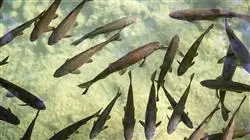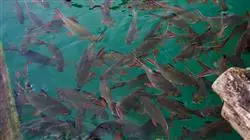University certificate
The world's largest faculty of veterinary medicine”
Introduction to the Program
A complete and total update on animal welfare with the most complete and effective online program on the market”

Aquaculture is an important livestock activity. Fish farming has increased in recent decades, and policy makers, scientists and consumers are increasingly focused on the farming practices used and the welfare issues that come with them. How we define welfare in fish and how we can measure it is of particular relevance in the case of these animals. Scientific approaches to assessing fish welfare are continually evolving. Challenges include the great diversity of fish species and production systems, as well as the general paucity of scientific data in this field.
This Postgraduate diploma examines the different production systems, either in inland water areas or in marine waters, as well as the different stages in fish rearing, from fry to adult. The effect of stocking density is an area of concern for welfare, which is complex, as it is affected by numerous interacting factors that are known to be species-specific.
Diet, feeding technique and management procedures have important effects on stress responses, subsequent stress tolerance, health and the occurrence of aggressive behavior. Strategies to reduce susceptibility to disease, minimize stress responses and avoid aggression are therefore vital.
The Postgraduate diploma in Animal Welfare in Fish Farming is a new and up-to-date program that arises from the growing demand among veterinary professionals for specialized education in animal welfare to minimize animal suffering, since, nowadays, consumers demand not only healthier and safer food, but also food obtained through practices that ensure animal protection and welfare.
It addresses the concept of Animal Welfare, its evolution and applied ethology, one of the main welfare problems in all animal facilities.
It also covers animal ethics or bioethics as a differentiating element with respect to other similar training courses. Since this topic is usually included in philosophy programs, it is usually addressed very superficially in health sciences. This highly relevant ethical aspect today will be extensively discussed in depth throughout this Postgraduate diploma in Animal Welfare in Fish Farming.
The program will help veterinary professionals acquire specialized and up-to-date knowledge in the field of animal welfare, which is increasingly demanded by society, as conflicts between animal advocates and those in food production are the order of the day.
Join the elite, with this highly effective educational training and open new paths to help you advance in your professional progress”
This Postgraduate diploma in Animal Welfare in Fish Farming contains the most complete and up-to-date scientific program on the market. The most important features include:
- The latest technology in online teaching software
- A highly visual teaching system, supported by graphic and schematic contents that are easy to assimilate and understand
- Practical cases presented by practising experts
- State-of-the-art interactive video systems
- Teaching supported by telepractice
- Continuous updating and recycling systems
- Autonomous learning: full compatibility with other occupations
- Practical exercises for self-evaluation and learning verification
- Support groups and educational synergies: questions to the expert, debate and knowledge forums
- Communication with the teacher and individual reflection work
- Content that is accessible from any fixed or portable device with an Internet connection
- Supplementary documentation databases are permanently available, even after the course
With a methodological design based on proven teaching techniques, this innovative program will take you through different teaching approaches to allow you to learn in a dynamic and effective way"
Our teaching staff is made up of professionals from different fields related to this specialty. That way we are sure to offer the training update we intend to provide. A multidisciplinary team of professionals trained and experienced in different environments, who will develop the theoretical knowledge in an efficient way, but, above all, will put at your service the practical knowledge derived from their own experience: one of the differential qualities of this training.
The efficiency of the methodological design of this Professional Master's Degree, enhances the student's understanding of the subject. Developed by a multidisciplinary team of e-learning experts, it integrates the latest advances in educational technology. This way, you will be able to study with a range of comfortable and versatile multimedia tools that will give you the operability you need in your training.
The design of this program is based on Problem-Based Learning: an approach that conceives learning as a highly practical process. To achieve this remotely, we will use telepractice learning: with the help of an innovative interactive video system, and learning from an expert, you will be able to acquire the knowledge as if you were actually dealing with the scenario you are learning about. A concept that will allow you to integrate and fix learning in a more realistic and permanent way.
A complete program that will allow you to acquire the most advanced knowledge in all the areas of intervention of a specialized veterinarian"

Our innovative telepractice concept will give you the opportunity to learn through an immersive experience, which will provide you with a faster integration and a much more realistic view of the contents: learning from an expert”
Why study at TECH?
TECH is the world’s largest online university. With an impressive catalog of more than 14,000 university programs available in 11 languages, it is positioned as a leader in employability, with a 99% job placement rate. In addition, it relies on an enormous faculty of more than 6,000 professors of the highest international renown.

Study at the world's largest online university and guarantee your professional success. The future starts at TECH”
The world’s best online university according to FORBES
The prestigious Forbes magazine, specialized in business and finance, has highlighted TECH as “the world's best online university” This is what they have recently stated in an article in their digital edition in which they echo the success story of this institution, “thanks to the academic offer it provides, the selection of its teaching staff, and an innovative learning method aimed at educating the professionals of the future”
A revolutionary study method, a cutting-edge faculty and a practical focus: the key to TECH's success.
The most complete study plans on the university scene
TECH offers the most complete study plans on the university scene, with syllabuses that cover fundamental concepts and, at the same time, the main scientific advances in their specific scientific areas. In addition, these programs are continuously being updated to guarantee students the academic vanguard and the most in-demand professional skills. In this way, the university's qualifications provide its graduates with a significant advantage to propel their careers to success.
TECH offers the most comprehensive and intensive study plans on the current university scene.
A world-class teaching staff
TECH's teaching staff is made up of more than 6,000 professors with the highest international recognition. Professors, researchers and top executives of multinational companies, including Isaiah Covington, performance coach of the Boston Celtics; Magda Romanska, principal investigator at Harvard MetaLAB; Ignacio Wistumba, chairman of the department of translational molecular pathology at MD Anderson Cancer Center; and D.W. Pine, creative director of TIME magazine, among others.
Internationally renowned experts, specialized in different branches of Health, Technology, Communication and Business, form part of the TECH faculty.
A unique learning method
TECH is the first university to use Relearning in all its programs. It is the best online learning methodology, accredited with international teaching quality certifications, provided by prestigious educational agencies. In addition, this disruptive educational model is complemented with the “Case Method”, thereby setting up a unique online teaching strategy. Innovative teaching resources are also implemented, including detailed videos, infographics and interactive summaries.
TECH combines Relearning and the Case Method in all its university programs to guarantee excellent theoretical and practical learning, studying whenever and wherever you want.
The world's largest online university
TECH is the world’s largest online university. We are the largest educational institution, with the best and widest online educational catalog, one hundred percent online and covering the vast majority of areas of knowledge. We offer a large selection of our own degrees and accredited online undergraduate and postgraduate degrees. In total, more than 14,000 university degrees, in eleven different languages, make us the largest educational largest in the world.
TECH has the world's most extensive catalog of academic and official programs, available in more than 11 languages.
Google Premier Partner
The American technology giant has awarded TECH the Google Google Premier Partner badge. This award, which is only available to 3% of the world's companies, highlights the efficient, flexible and tailored experience that this university provides to students. The recognition as a Google Premier Partner not only accredits the maximum rigor, performance and investment in TECH's digital infrastructures, but also places this university as one of the world's leading technology companies.
Google has positioned TECH in the top 3% of the world's most important technology companies by awarding it its Google Premier Partner badge.
The official online university of the NBA
TECH is the official online university of the NBA. Thanks to our agreement with the biggest league in basketball, we offer our students exclusive university programs, as well as a wide variety of educational resources focused on the business of the league and other areas of the sports industry. Each program is made up of a uniquely designed syllabus and features exceptional guest hosts: professionals with a distinguished sports background who will offer their expertise on the most relevant topics.
TECH has been selected by the NBA, the world's top basketball league, as its official online university.
The top-rated university by its students
Students have positioned TECH as the world's top-rated university on the main review websites, with a highest rating of 4.9 out of 5, obtained from more than 1,000 reviews. These results consolidate TECH as the benchmark university institution at an international level, reflecting the excellence and positive impact of its educational model.” reflecting the excellence and positive impact of its educational model.”
TECH is the world’s top-rated university by its students.
Leaders in employability
TECH has managed to become the leading university in employability. 99% of its students obtain jobs in the academic field they have studied, within one year of completing any of the university's programs. A similar number achieve immediate career enhancement. All this thanks to a study methodology that bases its effectiveness on the acquisition of practical skills, which are absolutely necessary for professional development.
99% of TECH graduates find a job within a year of completing their studies.
Postgraduate Diploma in Fish Farming Animal Welfare
According to the Food and Agriculture Organization of the United Nations (FAO) it is estimated that world fish production has exceeded 179 million tons according to the most recent measurements. In other words, there are hundreds of thousands of professionals behind this Aquaculture market and, consequently, the Veterinary Faculty of TECH Global University developed a Postgraduate Diploma course in Animal Welfare in Fish Farming. Its objective is to adopt good practices related to diet, feeding technique and handling procedures with fish, as these have effects on their health, stress response and disease occurrence.
The best postgraduate course in Animal Welfare
In order to help minimize the suffering to which animals are subjected, TECH offers veterinarians a program that examines the ethical implications of human beings on the welfare of fish. To this end, a large team of professors specialized in Animal Welfare studies in depth, in collaboration with their students, the following concepts: animal ethics, chronic stress in animals, Animal Welfare evaluation systems, animal abuse, the Universal Declaration of Animal Rights, legislation in America and Europe on Animal Protection and suffering in Fish Farming, among other topics.







